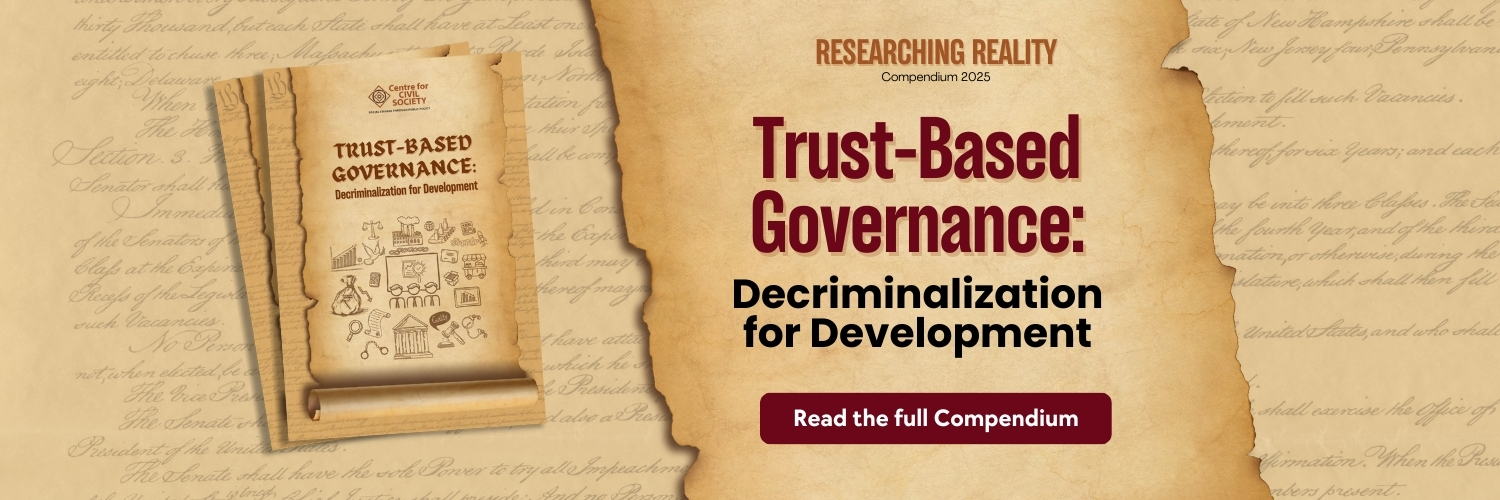The compendium "Trust-Based Governance: Decriminalisation for Development" emerges as a crucial response to India's pressing need for legal reform amidst its evolving governance landscape, particularly following the Jan Vishwas Bill, 2023. This initiative signals a transformative shift towards a framework that prioritizes proportionality, predictability, and trust, moving away from punitive measures and decriminalising various minor economic offences. The urgency of the compendium is underscored by India’s strong economic growth and the necessity of making these gains inclusive and sustainable. With insights drawn from various policy research institutions, the document highlights that laws should not merely be tools for punishment but should foster an environment conducive to entrepreneurship and innovation. By analyzing international best practices and addressing the burdens imposed by excessive penalties, the compendium advocates for a legal ecosystem that supports small businesses and promotes economic efficiency. Ultimately, it calls for a reimagined legal architecture that enhances dignity and well-being, reflecting a concerted effort to build a trusting relationship between the state and its citizens, thus laying the groundwork for a more responsive, citizen-centric governance model.
Central to the compendium’s recommendations is a coherent normative framework: the 10 Principles of Trust-Based Governance, which collectively orient the project toward a jurisprudence of trust. These principles-ranging from a presumption of liberty and constitutional restraint to subsidiarity and transparency-serve as functional decision rules rather than mere rhetorical adornments. They guide trade-offs, shape drafting choices, and clarify the policy logic behind decriminalisation. Through this lens, criminal sanctions are viewed as an exceptional measure, applicable only to conduct that is malicious, fraudulent, or seriously harmful to individuals or property. In cases where harms are primarily economic and remedial, civil liability and graduated monetary sanctions are deemed more fitting accountability instruments.
With insights drawn from various policy research institutions, the document highlights that laws should not merely be tools for punishment but should foster an environment conducive to entrepreneurship and innovation. The aspiration here is not only to facilitate business activities but also to craft regulations that enable individuals to live, work, and innovate freely, all within a framework grounded in trust and predictability.
Ultimately, the compendium advocates for a reimagined legal architecture that enhances dignity and well-being, reflecting a concerted effort to build a trusting relationship between the state and its citizens. It lays the groundwork for a more responsive, citizen-centric governance model, calibrated to improve ease of living, support micro and small enterprises, and limit disproportionate state intrusion in low-risk activities. These reforms extend the Jan Vishwas agenda and anchor legal change firmly within the aspirations of Viksit Bharat 2047.
-
What facilities will be available to me?
You will receive access to our extensive library and network of scholars.
-
Does CCS provide accommodation for outstation applicants?
The scholars are requested to make their own living arrangements in New Delhi for the training period.
-
Will I be working in a group or individually?
All scholars will work in groups of 3-4 members. Peer learning is a crucial part of the training program.
-
Is CCS flexible with the timeline of the program?
While April and May are self paced and flexible, June and July are full-time in Delhi. We are unable to offer flexibility during those two months. August would focus on wrapping up the capstone project; it would be remote and part-time.
